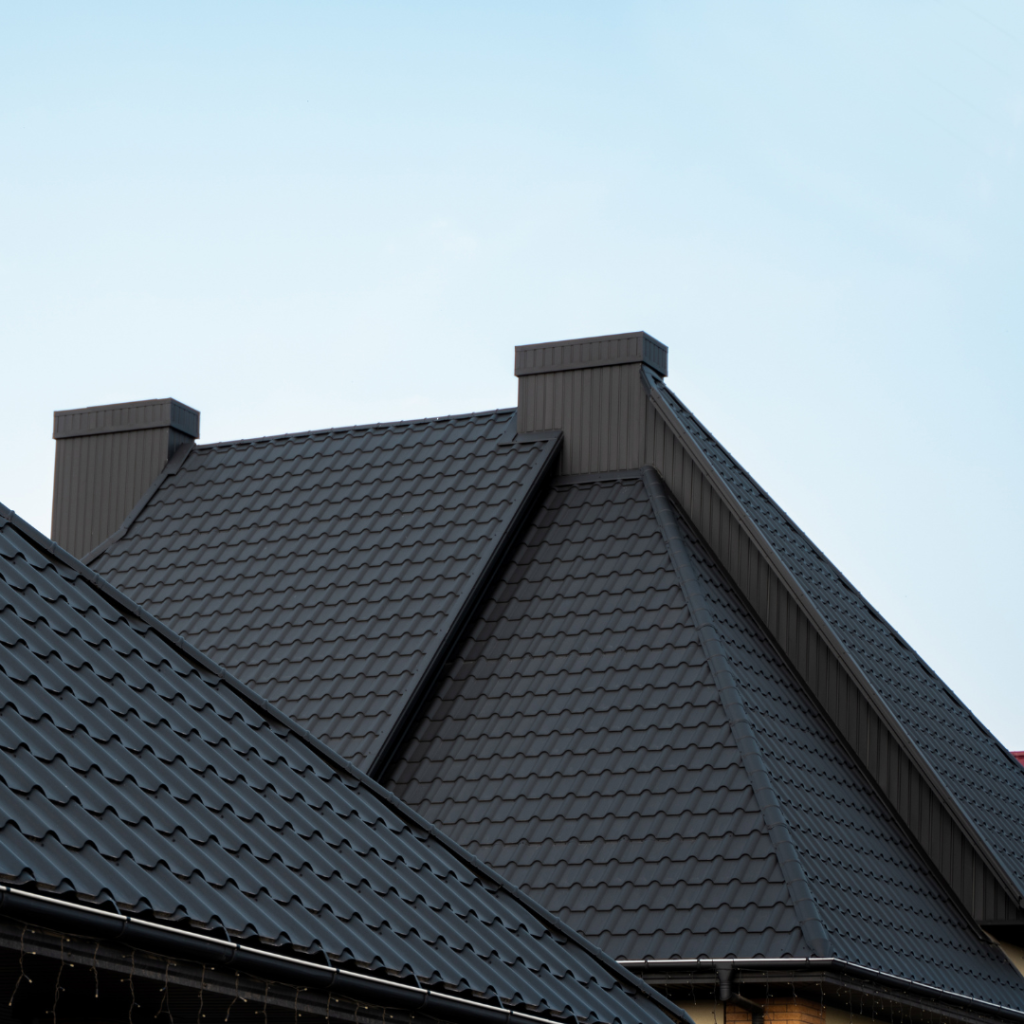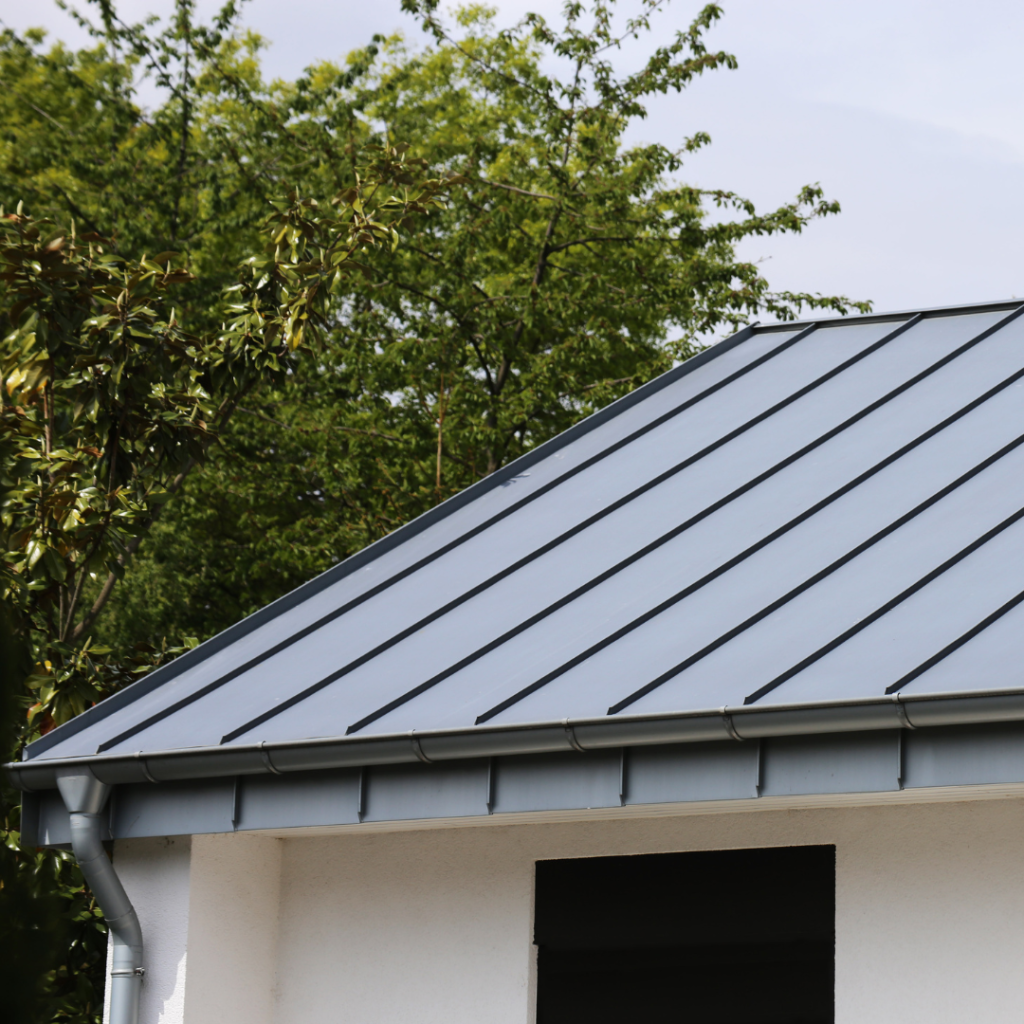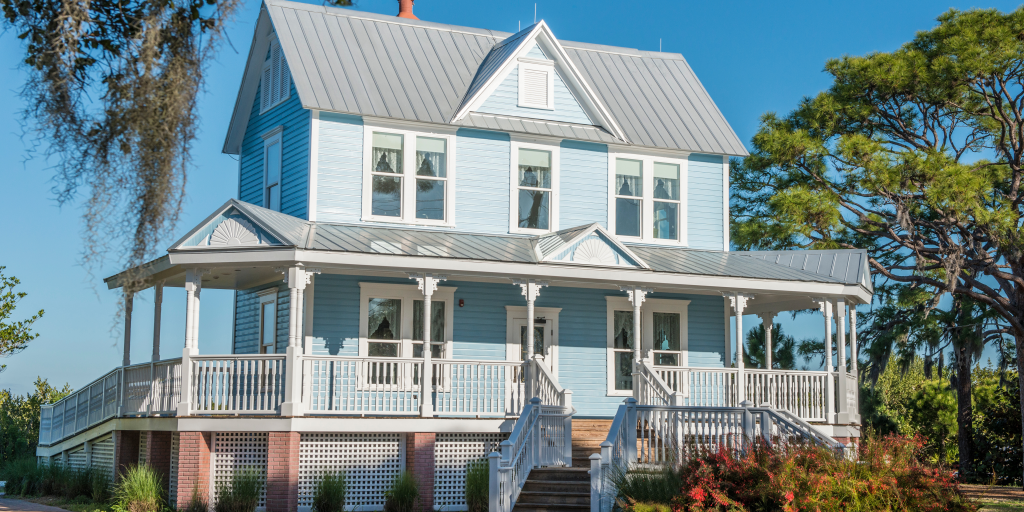Benefits of a Metal Roof
Metal roofs have several advantages over other types of roofing material. They are known for their exceptional durability and longevity, often lasting between 40 and 70 years, far surpassing traditional asphalt shingles. Metal roofs are highly resistant to extreme weather conditions like you find in Alma, AR, including heavy snow, strong winds, and hail, ensuring long-term protection for your home. Additionally, metal roofs offer significant energy efficiency benefits by improving insulation and reflecting solar heat, which reduces cooling costs and enhances indoor comfort.
Environmentally, metal roofs are a sustainable choice. They are frequently made from recycled materials and are fully recyclable at the end of their lifespan, reducing landfill waste and the demand for new raw materials. Although the initial investment for a metal roof can be higher, the long-term savings from reduced maintenance and energy costs make them a cost-effective option. Aesthetically, metal roofs come in a variety of styles and colors, enhancing the curb appeal of any home. Furthermore, they provide superior safety and protection with high fire and impact resistance. Low maintenance requirements and efficient installation processes further add to the benefits, making metal roofs a practical and attractive choice for homeowners.
Durability and Longevity
Metal roofs offer unparalleled durability and longevity compared to traditional roofing materials.
How Long Do Metal Roofs Last?
Metal roofs are designed to last between 40 and 70 years, significantly outlasting the average asphalt shingle roof, which typically lasts around 20 years. The longevity of metal roofs is due to their resistance to decay, insect infestation, and weather damage.
Resistance to Extreme Weather Conditions
Metal roofs are highly resistant to extreme weather conditions. They can withstand heavy snow, strong winds, and even hail without sustaining significant damage. The interlocking panels of metal roofs provide added strength and stability, ensuring your home remains protected during severe weather events.
Energy Efficiency
Metal roofs provide substantial energy efficiency benefits, making them a superior choice for eco-conscious homeowners.
How Metal Roofs Improve Home Insulation
Metal roofs enhance home insulation by creating an effective barrier against external temperatures. Their design allows for better air circulation and the use of reflective coatings. This combination keeps homes warmer in the winter and cooler in the summer, leading to reduced energy consumption and lower utility bills.
Reflectivity and Heat Absorption Properties
Metal roofs are known for their excellent reflectivity and low heat absorption. They reflect a significant portion of solar radiation, reducing the amount of heat that penetrates the home. This property decreases the need for air conditioning during hot months, further contributing to energy savings. The reflective coatings applied to metal roofs amplify these benefits, making them an ideal choice for energy-efficient roofing solutions.
Environmental Impact
Metal roofs offer significant environmental benefits, contributing to sustainability and eco-friendliness.
Recyclability of Metal Roofing Materials
Metal roofing materials are highly recyclable. Most metal roofs are made from recycled content, and at the end of their long lifespan, they are 100% recyclable. This reduces the demand for new raw materials and minimizes waste sent to landfills, making metal roofs a sustainable choice for environmentally conscious homeowners.

Energy Savings and Reduced Carbon Footprint
Metal roofs contribute to energy savings by improving home insulation and reflectivity, leading to lower energy consumption for heating and cooling. This reduction in energy use translates to a decreased carbon footprint. By choosing a metal roof, homeowners can significantly lower their environmental impact, promoting a greener and more sustainable future.
Cost-Effectiveness
Metal roofs provide excellent cost-effectiveness due to their durability and energy efficiency.
Long-Term Savings with Metal Roofs
Metal roofs offer substantial long-term savings. Their longevity, often exceeding 40-70 years, means homeowners avoid the frequent replacement costs associated with traditional roofing materials like asphalt shingles. Additionally, their low maintenance requirements further reduce ongoing expenses, making metal roofs a financially sound investment over time.
Initial Investment vs. Lifetime Value
While the initial investment for a metal roof may be higher compared to other roofing materials, the lifetime value is significantly greater. The durability, energy efficiency, and minimal maintenance of metal roofs result in lower overall costs throughout their lifespan. When considering the reduced energy bills and long-lasting protection, the initial higher cost is offset by the extensive benefits and savings over the roof’s lifetime.
Aesthetic Appeal
Metal roofs offer a wide range of aesthetic benefits, enhancing the visual appeal of any home.
Variety of Styles and Colors
Metal roofs are available in an extensive array of styles and colors, allowing homeowners to achieve their desired look. From traditional vertical seam profiles to designs that mimic wood shake, slate, or clay tiles, metal roofing can complement any architectural style. This versatility ensures that homeowners can find a metal roof that matches their personal taste and the overall aesthetic of their property.
Enhancing Curb Appeal with Metal Roofs
Metal roofs significantly enhance curb appeal by providing a sleek, modern appearance. Their clean lines and vibrant colors can make any home stand out, adding to its attractiveness and potentially increasing its market value. The durability and low maintenance of metal roofs also ensure that the home maintains its aesthetic appeal for many years, contributing to a beautiful and well-kept exterior.
Safety and Protection
Metal roofs provide superior safety and protection, making them a reliable choice for homeowners.
Fire Resistance of Metal Roofs
Metal roofs are highly fire-resistant, offering one of the best protections against fire compared to other roofing materials. They are non-combustible and have a Class A fire rating, the highest rating available. This makes metal roofs an excellent choice for areas prone to wildfires or where fire safety is a primary concern.
Impact Resistance and Structural Integrity
Metal roofs boast excellent impact resistance, capable of withstanding hail, heavy snow, and strong winds. Their structural integrity ensures they remain intact during severe weather conditions. The interlocking panels provide additional strength, reducing the risk of leaks and damage. This durability not only protects the home but also contributes to the roof’s longevity.
Low Maintenance Requirements
Metal roofs are known for their low maintenance needs, providing homeowners with peace of mind and long-term savings.

Easy Cleaning and Upkeep
Metal roofs are easy to clean and maintain. Their smooth surface allows debris, leaves, and snow to slide off easily, preventing buildup that can lead to damage. Routine maintenance typically involves simple tasks like clearing debris and checking for any minor issues, making upkeep straightforward and hassle-free.
Minimal Repairs Needed Over Time
Due to their durability and resistance to common roofing problems such as rot, mildew, and insect infestations, metal roofs require minimal repairs over their lifespan. Unlike other roofing materials that may need frequent patching or replacement, metal roofs maintain their integrity with little intervention, resulting in lower repair costs and fewer disruptions for homeowners.
Installation Benefits
Metal roofs offer several advantages during the installation process, making them a practical choice for many homeowners.
Quick and Efficient Installation Process
The installation of metal roofs is generally quicker and more efficient compared to traditional roofing materials. Metal roofing panels are manufactured in large sections, which means fewer pieces to handle and secure. This streamlined process not only reduces labor costs but also minimizes the time required to complete the installation, resulting in less disruption for homeowners.
Retrofit Options for Existing Roofs
Metal roofs can often be installed over existing roofing materials, eliminating the need for a costly and time-consuming tear-off. This retrofit option makes it easier and more affordable to upgrade to a metal roof. Additionally, installing a metal roof over an existing roof provides an extra layer of insulation, further enhancing energy efficiency and protection.
Metal Roof vs. Traditional Roofing Materials
Metal roofs offer numerous benefits compared to traditional roofing materials, making them a preferred choice for many homeowners.
Comparative Analysis: Metal vs. Asphalt Shingles
Metal roofs outperform asphalt shingles in several key areas. Metal roofs have a lifespan of 40-70 years, significantly longer than the 20-year average lifespan of asphalt shingles. They are more durable, resistant to extreme weather conditions, and require less maintenance. Additionally, metal roofs are more energy-efficient, reflecting solar heat and reducing cooling costs. While the initial cost of metal roofing is higher, the long-term savings and reduced maintenance make it a more cost-effective option over time.
Advantages Over Tile and Slate Roofs
Compared to tile and slate roofs, metal roofs offer superior durability and lighter weight. Tile and slate can be heavy, requiring additional structural support, whereas metal roofs are lightweight and easier to install. Metal roofs are also less prone to cracking and damage from freeze-thaw cycles. They provide similar aesthetic appeal with a variety of styles and colors, but with greater resilience and lower maintenance needs. Moreover, metal roofs are more energy-efficient, offering better insulation and reflectivity, which translates to energy savings.

Disadvantages of Metal Roofs
While metal roofs offer numerous advantages, there are also some disadvantages that homeowners should consider.
Higher Initial Cost
One of the primary disadvantages of metal roofs is their higher initial cost compared to other roofing materials such as asphalt shingles. The upfront investment for materials and installation can be significantly higher, which may be a barrier for some homeowners. However, it’s important to weigh this against the long-term savings and durability that metal roofs provide.
Noise Levels
Metal roofs can be noisier than other types of roofing, especially during heavy rain or hailstorms. The sound of rain or hail hitting the metal surface can be quite loud, which might be a concern for some homeowners. Adding additional insulation or sound-deadening materials can help mitigate this issue, but it may also increase the overall cost.
Expansion and Contraction
Metal roofs expand and contract with temperature changes. This can cause the fasteners to loosen over time, potentially leading to maintenance issues. Proper installation with appropriate fasteners and techniques can minimize this problem, but it’s still something homeowners should be aware of.
Denting and Surface Damage
Although metal roofs are generally durable, they can be susceptible to denting from heavy impacts such as hail or falling branches. While these dents may not affect the overall functionality of the roof, they can be unsightly and may require repair to maintain the roof’s appearance.
Complex Installation Process
The installation process for metal roofs is more complex and requires specialized knowledge and skills. This means that finding experienced roofing contractors can be more challenging, and the labor costs can be higher. Improper installation can lead to issues such as leaks and reduced longevity, so it’s crucial to hire qualified professionals.
Color Matching Issues
Over time, the color of metal roofs can fade due to exposure to the elements. If repairs are needed, it can be difficult to match the new panels with the existing ones, leading to a patchy appearance. This is particularly true for older roofs where the original color may no longer be available.
Potential for Corrosion
While modern metal roofs are designed to resist corrosion, they can still be susceptible in certain environments, especially in coastal areas with high salt exposure or in industrial regions with high pollution levels. Proper coatings and regular maintenance can help mitigate this risk, but it’s an important consideration for homeowners in such areas.
Roofers Alma AR – The Alma roofing contractor you can trust!
